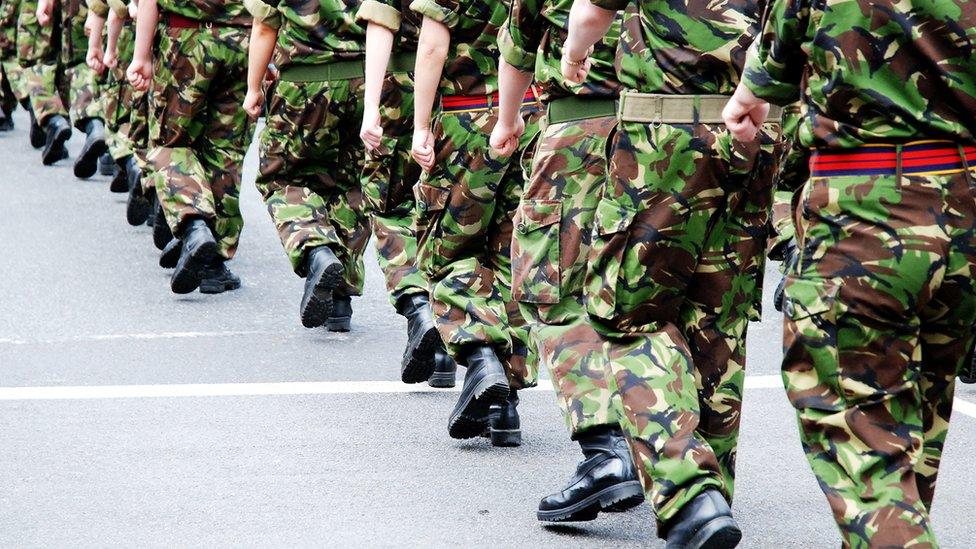Troubles prosecutions limit 'should apply to all'
- Published

A limit on prosecutions linked to the Troubles should apply to civilians as well as soldiers, Northern Ireland's veterans' commissioner has said.
Danny Kinahan, a former Ulster Unionist MP, said prosecutions for cases dating back decades were unlikely.
His comments came after Defence Minister Johnny Mercer resigned over the treatment of veterans who served in Northern Ireland.
First Minister Arlene Foster disagreed with Mr Kinahan's view.
"There is no equivalence between terrorists who go out to murder and maim and those veterans... who go out to serve their country and protect," she said on Wednesday.
"People who stepped outside the law and murdered and did things they shouldn't do... should be held to account."
'Can't take hope away'
Many people whose loved ones died during the Troubles were still hoping for justice, said the Democratic Unionist Party (DUP) leader.
"They know... that the prospects of getting justice for their loved ones is receding, however we cannot take that hope away for justice."
She suggested her party would support a time limit after which prosecutions could not be made against for soldiers who served in Northern Ireland.
She said that in cases dating back several decades it was wrong for there to be a "continual" use of "investigative methods that weren't available at the time" in order to bring cases against veterans.
In 2017 Mrs Foster said she had reservations about a possible amnesty for police and soldiers for Troubles-related murders.
She said she had concerns that such a move could lead to a wider policy that could deny justice to people whose relatives were killed.
'Limit has to be for everyone'
Mr Kinahan said Northern Ireland had to "find a way here to put [the Troubles] legacy behind us".
"I don't support anything that stops someone who should be going to court going to court but we do need to put some limit here," he said.
"I think it has to be for everyone... what we need is for everyone to engage and actually help find the solution.
"Everyone has red lines, we need to get people to move to pink lines or get ready to bend."

Defence Minister Johnny Mercer resigned over the treatment of veterans who served in Northern Ireland
He said there were cases "bubbling on people who served 30, 40 sometimes probably even close to 50 years ago".
"From all the people you speak to we're not likely to get any prosecutions from it.
"We're about to spend an absolute fortune going through it when the victims and survivors and the veterans and all their families need to be looked after."
'Endless investigations'
Mr Mercer's resignation came ahead of a House of Commons debate on the Overseas Operations Bill on Wednesday.
The new law is designed to protect veterans from unfounded prosecutions.
But soldiers who served in Northern Ireland will be excluded from that protection, something that Mr Mercer - a former Army captain - said was a "red line" for him staying in government.
He said the government had "abandoned people in a way I simply cannot reconcile" in allowing "endless investigations" into historic killings to continue.
Last year plans were announced by the government to restrict the number of Troubles killings which could be fully investigated under a new approach in which "new, compelling evidence" would be required.
The Overseas Operations Bill would go further for other veterans, such as those who served in Iraq or Afghanistan, proposing a five-year limit on criminal prosecutions.
Six former soldiers who served in Northern Ireland during the Troubles are facing prosecution.
Related topics
- Published20 April 2021

- Published16 March 2020
